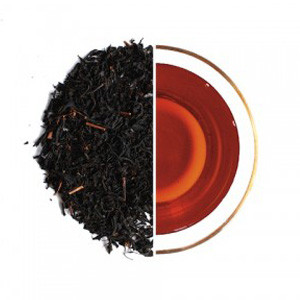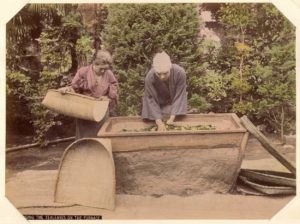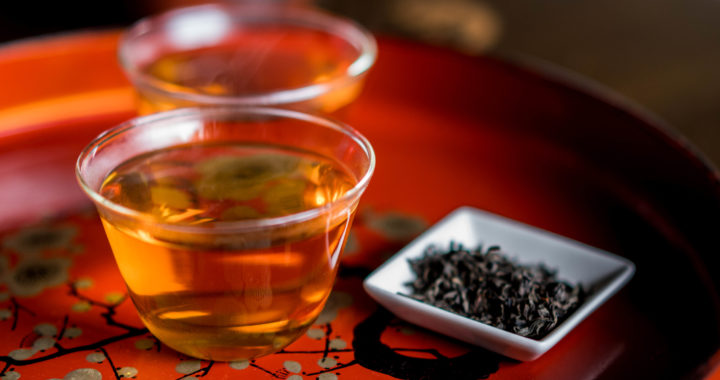As we’ve seen in the “What’s in a Name?” blog series, Japan is famous for producing green tea in great variety. There’s sencha, tencha, matcha, gyokuro, kukicha, bancha, genmaicha, and houjicha. These have been central to Japanese production for hundreds of years. However, if we look beyond green tea, there is even more delicious tea to discover! In that vein, let’s talk about Japanese black tea.

Wakoucha
Japanese Black Tea 和紅茶
Black or Red?
Although in English we refer to this kind of tea as “black,” in Japanese, it’s actually called red (kou, 紅) tea. Japanese water is soft, low in lime. Water in Europe can be quite hard. The tea actually reacts the the pH of the water it’s brewed in, so back in the day, the same tea brewed in Japan would look reddish, and brewed in Europe, it would be much darker.
Tea transported by sea would also be affected by the salty sea air, and would brew darker after the journey.
Production
Black tea production is quite different from green tea. Japanese green tea is steamed soon after picking, which kills enzymes and stops oxidation (browning). That’s why Japanese green teas like sencha are such a bright green. For black tea, however, oxidization is necessary, so they are left to wither for 16-17 hours.
Next, the leaves are rolled for several hours at room temperature by a rolling machine, which presses the leaves against the sides of a barrel to lightly bruise them, and then they are dried for preservation.
History

Tea processing in the Meiji period
Black tea was first produced in Japan about 150 years ago, during the Meiji period (1868-1912), when Japan was opened up to international trade. This economic shift stimulated a lot of experimentation in tea processing, especially to make it stand up to longer shipping times. Black tea stays fresh longer than Japanese-style steamed green tea, which is very sensitive to air and sunlight.
Japan began to export large quantities of tea to western countries, and in 1874, Japanese tea exported to the U.S. surpassed Chinese tea–quite a feat for a country so much smaller! However, the export boom did not last. The 20th century brought the World Wars and more drastic shifts in economy, and today, only about 2% of Japanese tea is exported.
The Japanese tend to prefer umami-rich senchas, and so black tea production shrank. Today there are only about 300 tea farmers producing black tea in Japan, and a very small amount of black tea is made.
Flavor Profile
Because Japanese tea cultivars are usually different from the ones grown in India, Sri Lanka, and other major black tea producing countries, Japanese black tea can taste quite different. While wakoucha maintains the earthy, sweet flair of black tea, its flavour is especially delicate, with just a hint of astringency. The color of the brew is a warm, red tone. This refreshing tea is perfect for a morning pick-me-up, or in combination with some afternoon deserts.
Why not try some?
Sources
Kusakabe, Kimbei. Wringing the Tealeaves on the Furnace. Digital image. Wikipedia Commons. Web.


Very few people know this much about black tea…Thanks for sharing this usefull information with us
Cool post, do you mind if I link to it from my
new blog/tea shop? Its called Lovely Tea Teas?
Thanks in advance – Oliver aka Mr Tea
What are the suggesting brewing instructions?
Thank you for the question. For Japanese Black Tea we recommend the following: 200 cc of water at 85C over 5g of tea leaves to steep for 30s. We hope that will help.
hi,
i bought my daughter some wakoucha for christmas. after some experimentation with steeping times we managed to work out what seems to be a good timing that works for us. tonight we made up 3 pots between us at around 7pm. it’s now 3am in the morning and neither of us can sleep because we are buzzing from the effects. it’s like having overdosed on energy drinks without the palpitations.
my body seems to have passed way more fluid than i have been drinking.’i’m a bit irritated because i want to sleep but i feel so energised and raring to go that i can’t see myself getting any sleep before daybreak.
the thing is, the taste is so very sublime, i could have had way more simply because it was so enjoyable to drink.
it’s not bitter in any way, it has a gentle almost delicate flavour profile that i have never experienced before. even with multiple steepings it just keeps delivering a wonderful feeling of contentment; almost like an internal hug.
so my lesson from this? never drink wakoucha in the evening if you value your sanity.
morning to mid-day should be fine for this divine tea secret, but never ever again a few hours before bedtime.
the annoying thing is that i could go for another pot of it right now…
Thank you, sir, for sharing a piece of valuable knowledge about Black Tea. I follow you for a long time. You have written very well about Black Tea.